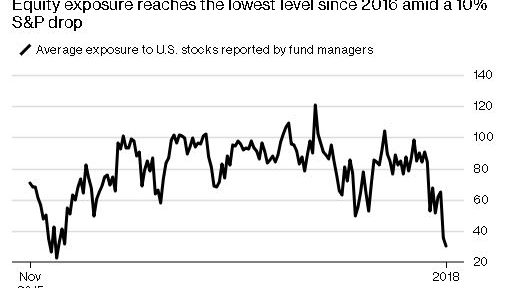- Home
- >
- Fundamental Analysis
- >
- Are we nearing a recession? Investors are looking for answers in the economy

Are we nearing a recession? Investors are looking for answers in the economy

Nine weeks of turmoil and correction in US stocks have stirred up a lot of worrying questions in the heads of investors, traders and analysts. What does the market say about the economy?
The word "recession" is increasingly appearing in the media, and signs of market chaos are being sought during this time, and investors seem to prepare themselves in advance. Shares are presented in a way that preceded a slowdown in the economy before. But the forecast for next year is taking a clearer form: slowing down growth rates, reducing corporate profits. Still, a lot of analysts do not associate this future phenomenon directly with an approaching recession. Many of them see the current sale as a "healthy" episode for the market after rising for ten years. But with the still booming trade war and Fed's current interest rate policy, analysts do not reject the possibility of a potential threat to the economy.
"What drives the sale? The idea is that the market senses something that we do not." - says Bruce McCain, chief investment strategist at KeyBank. It adds: "Given the slowdown in the world economy and economic growth, which are now weaker than you think, there are not many places to hide."
Scary momentum
More than $ 3 trillion worth of shares has been lost since auctioning began in October and boosted in late September. A momentum that dragged the S & P500 down 10% down, and technological shares well below the accepted correction levels.
In order to understand how much the sale was, we should see the number of shares in which the stable price momentum was broken this year, fell below 200 moving average. Support is now very thin, with only 37% of the companies included in the S & P500 retaining their long-term growth outlook.
At the same time, the graph above shows that it is wrong to take the markets too seriously when looking for a trace of the economy. While stocks in stagnation are at the forefront at their highest level, we have one precedent: Same signals in 2016, but there is no recession.
And now there is no such thing. At least, analysts say they are paid to anticipate recessions. The chances for the US to enter a new recession next year are 15%, according to the U.S. Bloomberg Recession Probability Forecast Index. Even the forecast for the next year is to have a slight slowdown to continue in 2020, the average forecast of economists is for economic growth of 2.6% over the next 12 months.
Economists do not always do well in their forecasts. A survey conducted in 2014 by the International Monetary Fund shows that none of the 49 recessions in the world suffered in 2009 were predicted or predicted by general and extreme opinion by economists in the previous year. Only two of the 60 recessions in 1990 have been properly predicted and investors have prepared themselves.
Regardless of statistics and who knows and who does not, investors are worried. They are starting to make more and more maneuvers towards defensive sectors that are doing better when there are problems in the economy. Utilities are the only sector that has been green since September, and has followed the broader market in nine consecutive quarters.
Some investors are looking for "shelter" from market upheavals in shares with reduced price movements. Smoother shares have a lower alpha rating when the setting is good and are supposed to "rise" in difficult times. Those who have ventured to avoid high risk have gone to Invesco S & P Low Volatility ETF and in funds that exceed the S & P500 since the beginning of the sale.
The gap that appears in the presentation between defensive and cyclical shares suggests that investors are beginning to assess possible scenarios of recession.
Societe Generale's Roland Kaloyan's strategist introduced the word beginning with P just before their more dramatic share scenarios. According to them, the S & P500 will reach levels around $ 2,400 in 2019, an 18% drop since September. However, even in their skeptical eyes, the danger of recession will overcome a more serious environment in 2020.
Shares still bear higher yields than 10-year securities, but are far from the most-loved asset. A recent survey by the National Association of Active Investment Managers shows that Mutual Fund exposures to stocks have fallen to 30.5% since 2016. In fact, this does not help to rebuild the markets, but throws a shadow that everything can fall apart. Bonds, commodities, metals, and government securities are under strong pressure throughout the year.
"Both stocks and metals reflect fears of a slowdown in the global economy, and therefore we have no return." - says Chris Zaccarelli, Chief Investment Analyst at Advisor Alliance. It adds: "During this time, the Fed will raise interest rates over the next six months, if not more, which also suppresses fixed income assets." The global debt lags on debt instruments, which stops the way for investors to escape. "
To be sure, economic indicators that often predict a recession - the yield curve of government securities and rising unemployment - if we look at them, they do not glow in red at all. The curve is real "flat" and the unemployment rate continues to fall.
Source: Bloomberg Finance L.P.
Graphs: Used with permission of Bloomberg Finance L.P.
 Trader Martin Nikolov
Trader Martin Nikolov Read more:
If you think, we can improve that section,
please comment. Your oppinion is imortant for us.

















